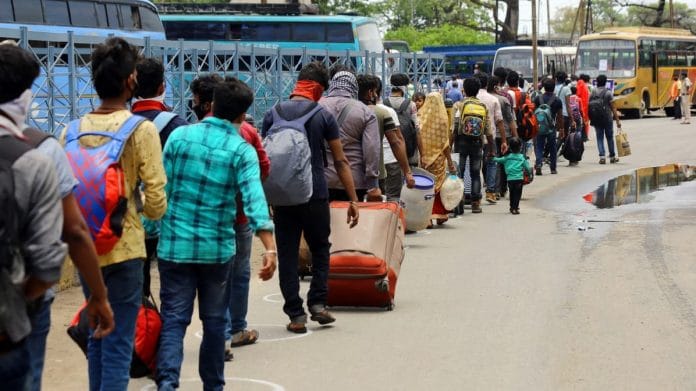New Delhi: Nearly 62 per cent of migrant labourers intend to return to work in cities in four to six weeks, a survey conducted by the Indian Institute of Management (IIM), Rohtak, has said amid the nationwide lockdown to curb the spread of Covid-19.
Around 23 per cent of migrant labourers had already resumed work in the week preceding 11 May, “as before lockdown”, the survey found.
Every four out of five respondents also reported having sufficient income and savings to sustain during the lockdown. One out of every five workers also received excessive food from the government, it said.
These findings were based on the responses of 12,108 low-income households surveyed across India between 25 March and 11 May.
The survey was undertaken by a research team led by IIM-Rohtak director Prof. Dheeraj Sharma, along with collaborative partnership with professors Sanjay Verma and Anand Jaiswal (IIM-Ahmedabad), Suresh Jakhar (IIM-Lucknow), Prashant Gupta (IIM-Trichy), Abhishek Mishra (IIM Indore), and Ashish Pandey (Indian Institute of Technology Bombay).
Other findings – on PDS and income
According to the survey, the coverage of ration cards was almost 87 per cent among the respondents. Of the total, 83 per cent were able to procure food during the lockdown. However, they reported long queues as issues while availing of the public distribution system (PDS) facilities.
In around 28 per cent of the households, the consumption of food reduced due to the lockdown. However, there was no change in food consumption in the remaining 72 per cent.
Around 63 per cent of the households have family members enrolled in government employment schemes like MGNREGA.
Although households have lost business incomes, direct benefit transfers (DBTs) by the Central and state governments have provided them with supplementary income – 77 per cent were aware of cash transfer schemes.
Of all the households, 68 per cent received free LPG cylinders during the lockdown period under the Pradhan Mantri Ujjwala Yojana.
More than 62 per cent were aware about the symptoms, precautions, and steps to prevent Covid-19.
Even as 83 per cent supported the Narendra Modi government’s decision to impose the lockdown, 86 per cent shopkeepers selling essentials reported their sales nearly halved in the lockdown period.
Also read: Why coronavirus is making India’s politicians nervous
How the survey was conducted
According to IIM-Rohtak director Sharma, “The survey comprised of questions relating to food availability, income, location, employment status, knowledge about COVID-19, and support from government and employers.”
His team “used snowball sampling to collect data from the respondents”. “The survey questionnaire was translated into Hindi, following the Brislin research protocol,” he said.
The average monthly income of the respondents was around Rs 12,500, indicating that they belonged to lower-income strata, and were representative of the 120 million migrant workers across the country.
Construction workers, daily wage earners, auto/bus/rickshaw drivers, agriculture workers were some of the people surveyed.
Recommendations
The survey report suggested that factory workers and farm owners should be incentivised to keep migrant workers within factories and farms.
The government could incentivise building of shelters and dwellings inside farms and factories as movement of labour to home state may not be in their best interest from an economic well-being standpoint, the report said.
“Nearly 58% of the migrant labor stated that they are willing to stay back if the free ticket is offered to them which has a validity of six months. In other words, while they want a free ticket they wish to have the flexibility of travel on later date,” it added.
“Cash transfers are preferred over other benefit transfers by the respondents and hence should be encouraged. District and sub-divisional officer could directly distribute cash to offer immediate help,” it said.
The report also recommended “expanding the scope of MNREGA”.
The writer is CEO of Indraprastha Vishwa Samvad Kendra, an RSS affiliate, and author of two books on the RSS.
Also read: Chappal, soap, ambulance — be prepared with these to help migrants, Amit Shah tells BJP






